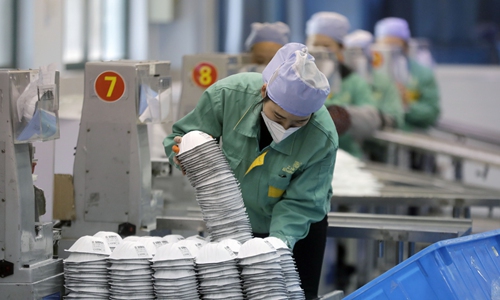HOME >> SOURCE
Epidemic tests China’s manufacturing sector
Source:Global Times Published: 2020/2/13 21:37:41

An employee of Chinese face mask maker Dasheng Health Products Manufacture Co works at the company's factory in Shanghai, East China on Friday. Photo: Yang Hui/GT
While the disruptive effect of the novel coronavirus pneumonia (COVID-19) outbreak on the global supply chain underscores the importance of China as the world's factory, the country's manufacturing advantage is now facing serious test and growing pressure.Shortages of medical equipment and medical supplies such as masks and protective outfits have led many to question the capability of China's manufacturing sector amid the COVID-19 outbreak.
The outbreak has resulted in explosive demand for medical supplies too great for any country to handle in such a short period of time. In order to ease such shortages, more than 3,000 Chinese enterprises have converted production lines to make medical supplies. China's state assets regulator is reportedly working on boosting the production of medical goods, with relevant centrally administrated state-owned enterprises expected to produce more than 1.6 million professional surgical masks per day by the end of this month.
The timely adjustment of production capacity certainly underlines the flexibility of relevant industrial chains in China, but whether or not additional capacity can meet the huge demand remains to be seen in the months to come.
Moreover, the epidemic has exposed some problems in China's industrial planning. It has long believed that China's manufacturing sector must move up the value chain from the low and medium ends to the high-end. And during the transition process, some industries deemed obsolete or low-end should be eliminated or shifted overseas to improve efficiency. However, the epidemic has shown that every link of the supply chain is of importance, and that any material supply could become indispensable. For instance, melt-blown non-woven fabric, one of the materials used to produce masks, is currently in short supply.
Given its complete supply chain despite industrial restructuring, producers in the industry are able to produce such materials to meet demands. The government needs to have more comprehensive and long-term planning for industrial development, particularly when it comes to making policies for pillar enterprises in low-end industries.
Furthermore, it should be noted that the outbreak will not only affect the domestic supply chain, but will also lead to a restructuring of the global industrial chain. While the impact of the coronavirus on domestic production is temporary, its impact on the industrial chain could be irreversible. Anticipating a disruption in the supply of auto parts from China, some Japanese and US carmakers have already begun adjusting their supply chains by ramping up production in other countries and regions. Such transfers of industrial chains could become permanent if China's manufacturing cannot return to normal as soon as possible, adding pressure for the country's future exports of manufactured goods.That means China also needs to guide its businesses to resume production accordingly based on local epidemic conditions while working on containing the spread of the virus.
Posted in: GT VOICE